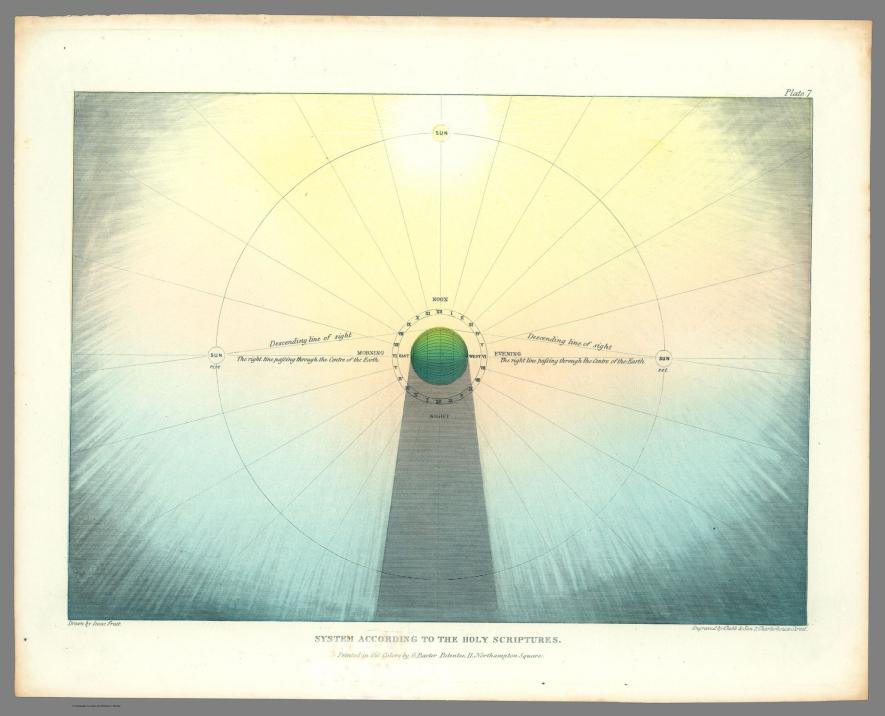
In 1975, the philosopher of science Paul Feyerabend published his highly contrarian Against Method, a book in which he argued that “science is essentially an anarchic enterprise,” and as such, ought to be accorded no more privilege than any other way of knowing in a democratic society. Motivated by concerns about science as a domineering ideology, he argued the historical messiness of scientific practice, in which theories come about not through elegant logical thinking but often by complete accident, through copious trial and error, intuition, imagination, etc. Only in hindsight do we impose restrictions and tidy rules and narratives on revolutionary discoveries.
Several years later, in the third, 1993 edition of the book, Feyerebend observed with alarm the same widespread anti-science bias that Carl Sagan wrote of two years later in Demon-Haunted World. “Times have changed,” he wrote, “Considering some tendencies in U.S. education… and in the world at large I think that reason should now be given greater weight.”
Feyerabend died the following year, but I wonder how he might revise or qualify a 2018 edition of the book, or whether he would republish it at all. Politically-motivated science denialism reigns. Indeed, a blithe denial of any observable reality, aided by digital technology, has become a dystopian new norm. But as the philosopher also commented, such circumstances may “occur frequently today… but may disappear tomorrow.”
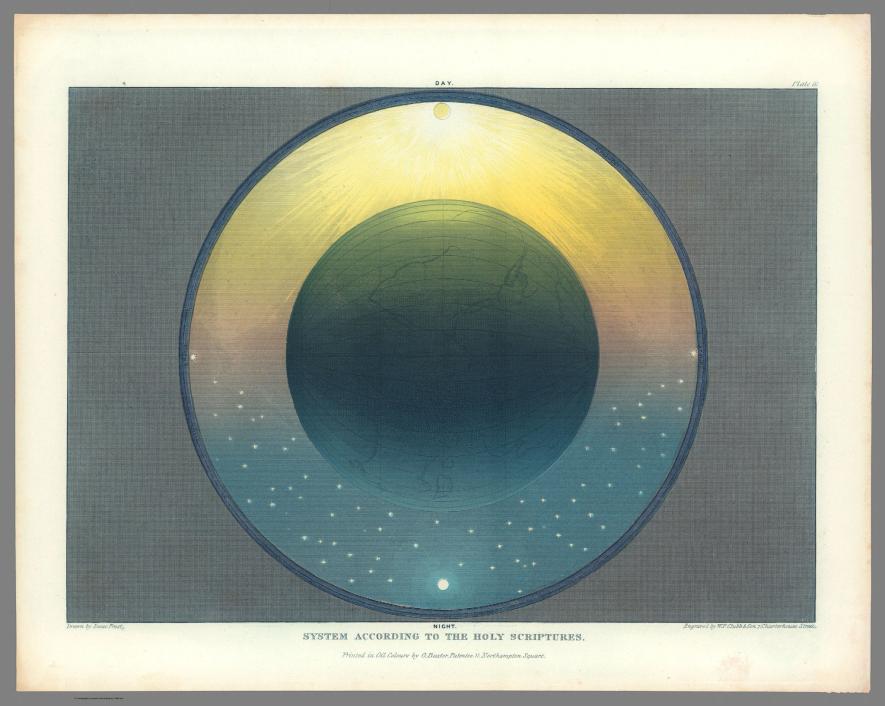
In the recorded history of human inquiry across cultures and civilizations, we see ideas we call scientific co-existing with what we recognize as pseudo- and anti-scientific notions. The differences aren’t always very clear at the time. And then, sometimes, they are. During the so-called Age of Reason, when the development of the modern sciences in Europe slowly eclipsed other modes of explanation, one obscure group of contrarians persisted in almost comically stubborn unreason. Calling themselves the Muggletonians, the Protestant sect—like those today who deny climate change and evolution—resisted an overwhelming consensus of empirical science, the Copernican view of the solar system, despite all available evidence the contrary. In so doing, they left behind a series of “beautiful celestial maps,” notes Greg Miller at National Geographic, some of which resemble William Blake’s visual poetry.
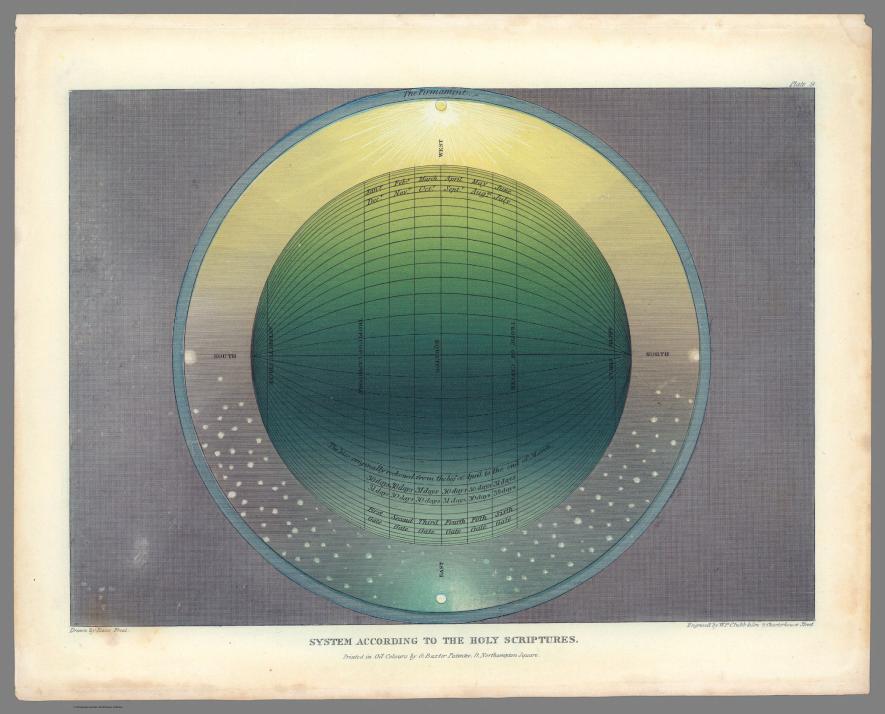
The sect began in 1651, when a London tailor named John Reeve “claimed to have received a message from God” naming his cousin Lodowicke Muggleton as the “’last messenger for a great work unto this bloody unbelieving world.’… One of the main principles of their faith, a later observer wrote, was that ‘There is no Devil but the unclean Reason of men.’” Their view of the universe, based, of course, on scripture, resembles the Medieval Catholic view that Galileo attempted to correct, but their principle antagonist was not the Italian polymath or the earlier Renaissance astronomer Copernicus, but the great scientific mind of the time, Isaac Newton, whom Muggletonians railed against into the 19th and even 20th century. Muggletonians, Miller writes,” had remarkable longevity—the last known member died in 1979 after donating the sect’s archive of books and papers… to the British Library.”
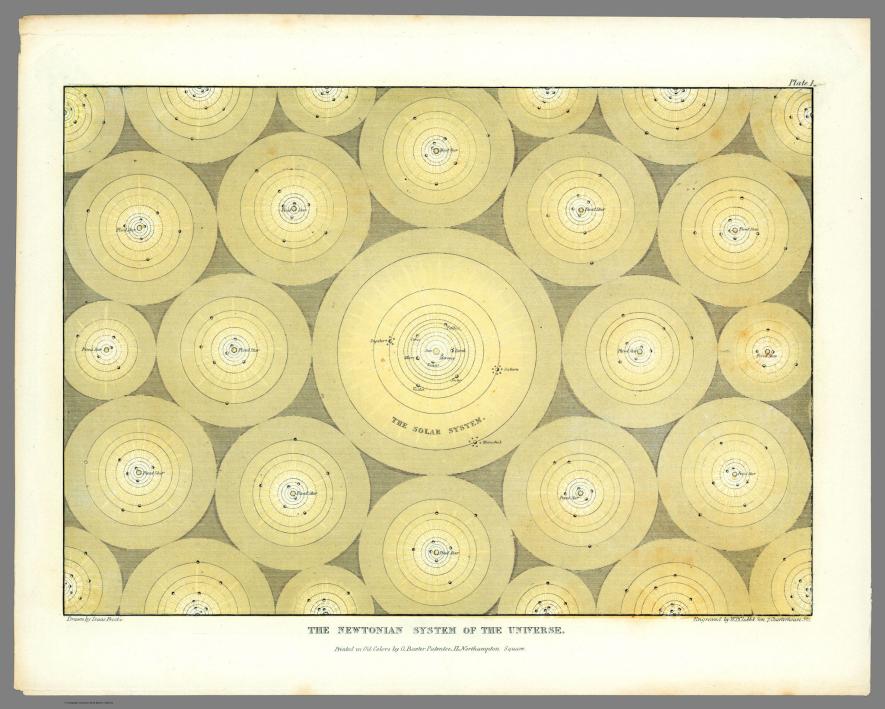
These plates come from an 1846 book called Two Systems of Astronomy. Written by Muggletonian Isaac Frost, it “pitted the scientific system of Isaac Newton—which held that the gravitational pull of the sun holds the Earth and other planets in orbit around it—against an Earth-centered universe based on a literal interpretation of the Bible.” The plate above, for example, “attempts to show the absurdity of the Newtonian system by depicting our solar system as one of many in an infinite and godless universe.” Ironically, in attempting to ridicule Newton (who was himself a pseudo-scientist and Biblical literalist in other ways), the Muggletonians stumbled upon the view of modern astronomers, who extrapolate a mind-boggling number of possible solar systems in an observable universe of over 100 billion galaxies (though these systems are not enclosed cells crammed together side-by-side). Another plate, below, shows Frost’s depiction of the hated Newtonian system, with the Earth, Mars, and Jupiter orbiting the Sun.
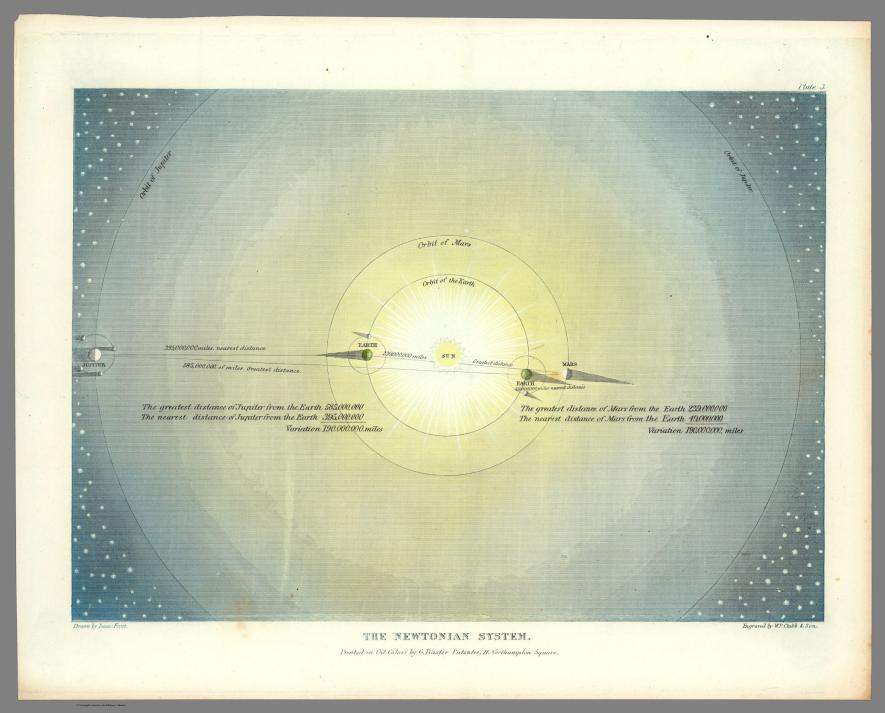
The other maps, further up, all represent the Muggletonian view. Historian of science Francis Reid describes it thus:
According to Frost, Scripture clearly states that the Sun, the Moon and the Stars are embedded in a firmament made of congealed water and revolve around the Earth, that Heaven has a physical reality above and beyond the stars, and that the planets and the Moon do not reflect the Sun’s rays but are themselves independent sources of light.
Frost gave lectures at “establishments set up for the education of artisans and other workmen.” It seems he didn’t attract much attention and was frequently heckled by audience members. Like flat earthers, Muggletonians were treated as cranks, and unlike today’s religious anti-science crusaders, they never had the power to influence public policy or education. For this reason, perhaps, it is easy to see them as quaintly humorous. Frost’s maps, as Miller writes, “remain strangely alluring” for both their artistic quality and their astonishingly determined credulity. The plates are now part of the massive David Rumsey collection, which houses thousands of rare historical maps. For another fascinating look at religious cartography, see Miller’s National Geographic post “mapping the Apocalypse.”
Related Content:
How a Book Thief Forged a Rare Edition of Galileo’s Scientific Work, and Almost Pulled it Off
Josh Jones is a writer and musician based in Durham, NC. Follow him at @jdmagness


Never heard of this group, Josh, but couldn’t agree more with 90% of their holdings after my own, not shabby, investigation of Masonic lies down through he ages.
Science, like religion, law, history, governments and such are all lies and misdirection created to confuse and control the masses.
My take is that Newton, Copernicus, Galileo, Jenner, Darwin, Einstein, and on and on, were rewarded handsomely for their efforts to create false memes and a controlled reality.
Further, as the same alleged humans run it, it’s no small wonder that the latter names all won Nobel (another 33rd degree dude) prizes to ‘recognize’ their groundbreaking achievements.
See how that works?
We live in Roman times, mi amigo
PS like your stuff — carry on ;)
Before the author equates those who challenge today’s climate change advocates with “Muggletonians”, he should read Steven Koonin’s Sept. 19, 2014 op-ed in the WSJ entitled “Climate Science is Not Settled.” And lest Mr. Jones assume that Dr. Koonin is of Muggletonian descent, he need not fear; he is a former Professor of Theoretical Physics at Caltech and former undersecretary for science in the Energy Dep’t during the Obama administration. It is certainly easier to denigrate those with whom we disagree, but I would suggest that addressing arguments head-on is a more fruitful (and civil) endeavor.
On the one hand, Gerald, I’ll grant that the example of climate denialism may be inaptly chosen here. Because climate denialism is not so much about religion as about profit: huge short-term gains for a very few people at the expense of billions of other people’s well-being for who knows how far into the future. (Look up “what Exxon knew about climate change,” for example.)
On the other hand, perhaps we might consider the belief that profit matters more than people a kind of quasi-religious delusion: greed on a scale of worship. I do not “denigrate” climate denialists by pointing out that they “resist an overwhelming consensus of empirical science.” That is a factual account what they are doing. You’ll need to do better than cite a single four-year-old WSJ op-ed (published, that is, before last year’s hurricane season), written by a onetime employee of BP. I cannot personally testify as a scientist, so Koonin and his like are not people “with whom I disagree,” personally. But I defer to other scientists, such as the gentleman at the link below, who points out that much of Koonin’s criticism of climate science parrots denialist talking points rather than making substantive claims.
http://www.slate.com/articles/health_and_science/science/2014/10/the_wall_street_journal_and_steve_koonin_the_new_face_of_climate_change.html
Climate science seems settled *enough* that to take *no* action but rather continue in the same destructive direction seems irrational and grossly irresponsible, as we can see already in the thousands of people losing their homes and the ecosystems and species rapidly disappearing. Settled *enough* is typically good enough in many sciences to move forward, since we don’t prove most things beyond any and all doubt, but rather arrive at the highest degree of probability based on the best available evidence, then revise as more and better evidence comes. Well over 90% of the scientists who study these matters seem to agree on a high degree of probability for human-caused climate change. Those who disagree generally seem motivated by reasons having nothing at all to do with science.
If they stubbled upon solar system symmetry by accident and in parade.…what would happen if they’re mockings correct and other systems lay just next door.
As a Christian God asks us to put up with a lot from other Christians, accepting Cannon and putting up with childishness. Paul had no problem with the philosophers of Athens as long as each one accept the foundations, the basics of Christianity.
Saddly, the Muggletonians deny the basics saying there is no Devil. True, there is the stupidity of ourselves, but when everything is going right and everyone gets along, where does that word, distention lacking sense, that throws all into turmoil and that hatred of Iago’s that just hates, where does it come from?